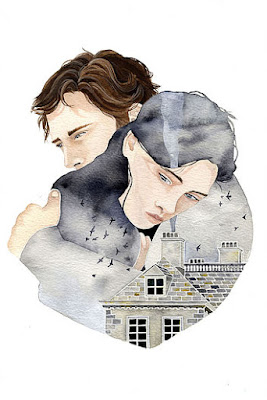Mansfield Park, ch. 45: Ill-Will
 |
| Credit to Angela Hadrill again. |
It’s a bit of a dirty trick to have the men of Mansfield hide the true state of Tom’s sickness from his own mother. But I suppose they’re looking out for Lady Bertram’s peace of mind, which is sweet in its own way. Note that Ed keeps Fanny updated on Tom. Either he thinks that Fanny is owed the truth or he believes Fanny can handle it in a way Lady Bertram can’t (or both).
Also, let’s examine this newfound bond between the two estranged brothers: “when able to talk or be talked to, or read to, Edmund was the companion [Tom] preferred.” Well, well, well. Quite a change from the halcyon days of their theatricals! Turns out that Ed is—get this—a perfect companion for a helpless family member. I, for one, am shocked (/ sarcasm). While this is another way of demonstrating Ed’s compassion and understanding, it’s also rather sweet that Tom reaches out to him at all. The last time we saw them interact with one another, the subtext was rather depressing. Whether Tom is now swallowing his pride and accepting Ed with love or is simply too weak to think of anything but his present predicament (which sounds awful, to be fair), it’s too early to tell.
One thing this illness has affected? Ed’s priorities. He tells Fanny he was about to write to Mary, but now he thinks he’d stand a better chance proposing in person.
Oh, and another thing: all this strife and unhappiness unfolding at Mansfield has Fanny realizing just how much she misses the place. “Portsmouth was Portsmouth,” she sighs. “Mansfield was home.” Critics (and Fanny-lovers, too) tend to point out that Fanny is more of a static character than Austen’s other main characters—her development happens off-screen most of the time, and even then it only appears to happen near the beginning of the story and near the end. That’s all true. What changes most about Fanny is not her behavior, but her perception about her place in Mansfield Park. She has accepted that she needs Mansfield just as much as Mansfield needs her. She singles out Lady Bertram specifically, and it’s hard to ignore that her aunt tends to act like a poor invalid herself. Fanny imagines she “could have talked to her, and tried at once to make her feel the blessing of what was, and prepare her mind for what might be.” Whoa. That’s a tall order, but Fanny thinks she can fill it. And just listen to her! She’s no longer making excuses or thinking of what she owes to the Bertrams. This is about family. (Note also her surprise at Maria and Julia’s apparent indifference. She doesn’t waste any time feeling guilty for wanting to be at Mansfield when they want to stay away.)
Also, I have to say that the line about the “increasing beauties” of springtime stands out to me. I didn’t realize when I began this blogging project that the timeline would line up so beautifully IRL. I find Fanny’s cabin fever incredibly easy to relate to.
After at least a week of radio silence, Fanny is graced with another letter from Mary. And what. A. Doozy. This letter is. There’s only one reason why Mary has written to Fanny: to get a better sense of Tom Bertram’s illness. And putting aside the crassness of her inquiry, everywhere you look, there’s another example of how alarmingly dumb Mary is. “Fanny, Fanny, I see you smile and look cunning, but, upon my honour, I never bribed a physician in my life,” she says winkingly, as if Fanny has ever even indicated that she has a cunning bone in her body. “If [Tom] is to die, there will be two poor young men less in the world,” she reasons as she writes to their family member.
Is it possible that Mary is just as deceived about Fanny’s real character as Ed is about Mary’s? Ed assumes that Mary is as kind, sweet, and moral as Fanny is. And Mary sees in Fanny her own crass values and love for money. It’s even more weird when you consider that Mary also sees how pure and modest Fanny is. Like, did she just forget this part of Fanny, or does she assume that it can exist alongside an unhealthy obsession for wealth and rank?
To be fair, Fanny isn’t exactly a picture of perfection, as she must struggle against Mary’s “tempting” offer of having them cart her back to Mansfield. She ultimately realizes she doesn’t want Mary and Henry as traveling companions (she is disgusted at “the sister’s feelings, the brother’s conduct, her cold-hearted ambition, his thoughtless vanity.”), and that she doesn’t want to risk irritating Sir Thomas. And she reveals that she’s not exactly indifferent to Henry’s behavior as “the acquaintance, the flirt perhaps, of Mrs. Rushworth” because “[s]he had thought better of him.” She admits that she’s “mortified”! Well, given that he’s declared his devotion to Fanny, I’d say that she’s a little entitled. She can’t even catch a break from her professed admirer. Also interesting? She’s not judging Maria for this apparent transgression.
Fanny strives for honesty in her response letter even though she knows it’ll only feed Mary’s hopes that. You know. Her crush’s older brother will die. I mean, haven’t we all been there?
Next chapter: It’s the bad news parade, folks.


Comments
Post a Comment